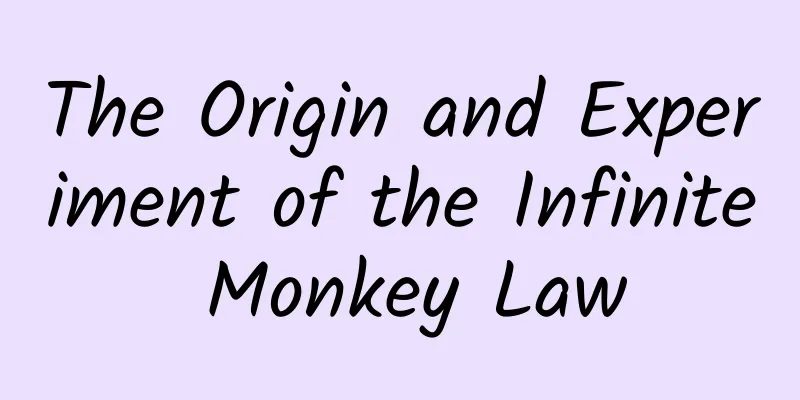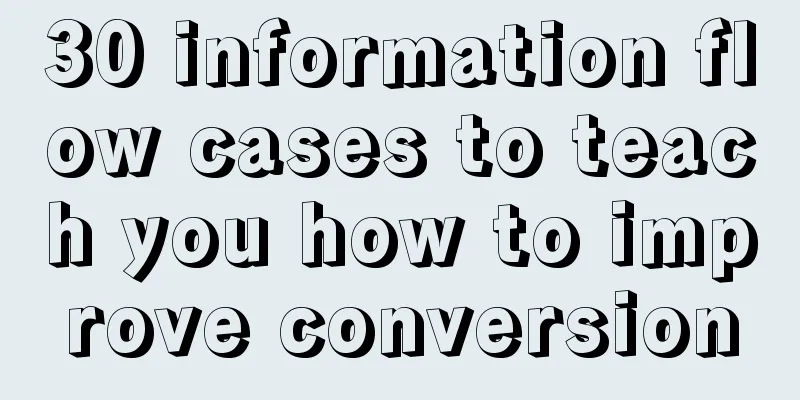The Origin and Experiment of the Infinite Monkey Law

|
Leviathan Press: According to the calculation method introduced in the article, for example, it would take a monkey longer than the life of the universe to type Shakespeare's works. We can indeed regard this as an "impossible event". However, this impossibility is an approximate result with a very small probability, so there are obvious limitations. When we feel that a period of time is so long that it is almost endless, it may just be because our own life is too short, that's all. It is indeed difficult for a monkey to complete this task by typing randomly on the keyboard. However, we always overlook one point: Shakespeare, who wrote many works, is also the result of the evolution of monkeys as a human being in a sense (at least most people think so now). Can such an irrefutable fact prove the validity of the infinite monkey law? We have modern civilization through evolution, so where does the driving force of evolution come from? Of course, this is another question. The idea that even absolutely random behavior can produce complex results given enough time has been proposed for at least a few thousand years, but it has had its critics even in the past. For example, Cicero, in his De Natura Deorum (45 B.C.), made the following statement: Does anyone, faced with the world of things, really imagine that the specific, individual movements of things are due to some natural force, natural attraction of things? Does anyone, faced with this beautifully decorated world, really imagine that this world is composed of a large number of random events? If someone believes this, then this person must also believe that when we make a dozen or twenty letters of gold or other materials and throw a large number of artificial letters into the air, when these letters fall to the ground, they will form a clear order in the epic work of Quintus Ennius, The Annales. I doubt if even by luck, you can spell out a single line of poetry in this way. In this case, how can these people assert that the world is composed of a random collection of elementary particles... If a large number of random particles can make up our world, why can't they also form porches, temples, houses, cities? Which type of particles is simpler and easier to make? Fast forward to more modern times, and the latest version of this idea is that monkeys can type out Shakespeare on typewriters, but it's unclear who first made this claim. You can see a lot of citations that the earliest source of this claim is Thomas Henry Huxley, a 19th-century biologist and comparative anatomist who was born in 1825 and died in 1895. He was nicknamed "Darwin's Bulldog" because he always defended the theory of evolution and was quite combative. Thomas Henry Huxley (1825-1895). © Wikimedia In fact, on November 23, 1859, the day before Darwin published On the Origin of Species, Huxley wrote to Darwin that he was ready: "I finished your book yesterday... I am ready to wield a big stick if necessary to support you... As for those mutts who will bark at you, when you face them, remember that you have some friends... and they must be those who are good at fighting... They will help you to stand firm. I am sharpening my claws and beak to be fully prepared." As for the infinite monkey theory, it dates back to June 30, 1860, when Huxley and British Bishop Samuel Wilberforce had a debate, or at least what popular history records as a debate. In fact, it is more accurate to say that the two were at Harvard University for a lecture on a paper, followed by a public discussion in which several prominent scientists shared their ideas. The topic of discussion was Darwin's new theory, and the situation was completely opposite to the usual impression of such discussions today. For example, Bishop Wilberforce's speech was more concerned with the scientific merits of the theory than with religious content as one might imagine. In fact, this is not surprising. If you know about the "Creationism and Evolution Debate" that broke out soon after, you will find that most Christian theologians in the world at that time did not think that there was any huge contradiction between evolution and the Bible, because the Bible did not specifically describe how God created living things, but only recorded the general order in which God created the world. In the early days of this debate, from the perspective of Christians, the only small contradiction between creationism and evolution was the need to clarify the time scale. Anyway, back to the 1860 discussion. At one point in the discussion, Wilberforce allegedly made the classic argument that “the existence of a watch implies the existence of a watchmaker”—in other words, a system this complex could not have arisen by chance. Huxley allegedly countered this with this scenario: 6 eternal…Give an ape 6 eternal typewriters, endless paper and ink, and if they had enough time, they might accidentally write a poem, a Shakespearean sonnet, or even a book…and they would just randomly hit typewriter buttons. So, is the infinite monkey theory really from Huxley? That doesn't seem to be the case. You have to remember that while this is perhaps one of the most famous scientific debates in centuries, the fact is that nobody at the time even thought to keep a detailed record of what everyone said during the discussion. At the time, it was just a friendly public scientific discussion. It wasn't headline news, so no one sat in the meeting room and scribbled down every word. Not only that, most of the original words of the discussion that are known today were actually collected and sorted out decades later from people who were present, or found in contemporary letters. As for the first source, I leave it to you to judge its reliability. Try to recall a lengthy discussion you had a few weeks ago and see if you can recall any details of it accurately—or even if you can remember anything about it at all. The first source was collected 20 or 30 years after that discussion. As for the discussion speeches in the debate known as the "Huxley-Wilberforce Debate", there is another detail worth noting, that is, the people who collected and organized the discussion speeches decades later were mainly Darwin's supporters. Contrary to popular misconceptions that have been fueled by this collated information, the few contemporary records that exist seem to indicate that the debate was mild rather than violent, with multiple speakers who all considered their own contributions to be the best. Huxley, for example, soon afterwards said that he was "the most popular man at Harvard for the next twenty-four hours after the debate." Wilberforce, on the other hand, said, "I had a long debate with Huxley, and I thought I had completely defeated him." Joseph Hooker, one of the many scientists who participated in the discussion, also wrote in a letter, "I have been encouraged and praised by the most senior scholars at Harvard." Hooker was also a good friend of Darwin. Shortly after the debate, Hooker wrote to Darwin in which he seemed not to be impressed by Huxley's debate. He wrote: Sam Oxon stood up and spent a good half hour talking about the uniqueness of the mind. Huxley's rebuttal was admirable...but...he failed to address the fatal flaw in Sam's speech, and he failed to continue the discussion in a way that would have attracted the audience. As for the recollections of others afterwards, they were just arguments about who had made the most incisive point in the discussion - if anyone could really do that. In any case, after the discussion it was said that all the key players involved in the discussion apparently "showed up to the post-discussion dinner with their heads held high" and no one seemed depressed. Returning to the question of whether Huxley proposed the infinite monkey theory in his speech, there is no contemporary documentation indicating that he did say such a thing. Perhaps the most damaging evidence against Huxley is that the world's first truly commercially successful typewriter would not be introduced until 10 years after this debate. Moreover, the device went through a few design changes before it was introduced, and the changes were so extensive that almost no one except its inventor and his assistant had ever heard of it. So the question is, who first proposed the infinite monkey theory, a recent version of an old discussion? The earliest known paper stating this seems to come from a 1913 paper by French scientist Emile Borel, La mécanique statique et l'irréversibilité. In the paper he stated: Let us imagine that a million monkeys have been trained to press typewriter buttons at random, and that they work under the supervision of an illiterate foreman, who works 10 hours a day and is equipped with a million typewriters of different models. The illiterate foreman's job is to collect the sheets of paper printed with letters and connect them into scrolls. Then, a year later, we may find in these scrolls the contents of certain books, not only any books, but also any language, and perhaps those books are kept in the richest libraries in the world. In a large enough space and time, this possibility may occur in an instant, and this possibility, which deviates significantly from most cases, is considered to be the most likely phenomenon in statistical mechanics... In the following 20 years, other scholars repeated the same argument until 1930, when James Jeans finally recorded the source of the argument as Huxley in his book The Mysterious Universe. However, he did not write Huxley's full name in the book, but only wrote that a person named "Huxley" first proposed this statement. Of course, whoever first linked monkeys and typewriters, the idea has captured the imagination of countless people, and some intrepid researchers have recently tried to test the hypothesis in an experiment to see if they can get monkeys to write Shakespeare. In 2003, for example, students and faculty at the University of Plymouth’s School of Digital Arts and Technology fraudulently obtained €2,000 in research funding (roughly $3,665 today) from the school’s Arts Council for no more than traveling to Paignton Zoo in Sulawesi and placing a computer and keyboard in the enclosure of Sulawesi crested macaques (Macaca nigra). After a month of living together, Gum, Heather, Mistletoe, Elmo, Holly, and Rowan wrote five pages of nonsense. In addition, the monkeys seemed to limit their desk work to urinating or defecating (or doing it at the same time), and finally the computer could not run due to the defecation during the desk work. According to the person in charge of the project, since the project started to be broadcast online, it has achieved considerable success because it "provides quite exciting and fascinating pictures." If we leave the real world and enter the digital virtual world, we can also find a study that uses a computer program to simulate a monkey randomly typing on the keyboard. The good news is that the monkey in this experiment will never urinate or defecate on the computer at will again. Moreover, it successfully typed out the first 19 letters of Shakespeare's play "The Two Gentlemen of Verona", "VALENTINE. Cease to..." For these 19 letters, it only took this virtual monkey 421625×10²³ years. In a similar study, a virtual monkey called the Monkey Shakespeare Simulator took just 273,785 × 10³⁵ years to type out a line from another Shakespeare play, Henry IV: “RUMOUR. Open your ears…” Another study began on August 21, 2011. This time, the virtual monkeys were actually millions of computer programs on Amazon's SC₂ Cloud, which randomly generated strings of 9-character character sequences. After just one month, the researchers basically got all the words in Shakespeare's play "A Lover's Complaint". But they were too shy to continue to reproduce Shakespeare's other works. But there is a problem with this method. Once a virtual monkey generates a string of 9 characters, and the words contained in the string happen to appear in Shakespeare's works, then this string of characters is considered to have successfully spelled out a word in the work. According to mathematics professor Ian Steward, this method of randomly forming the words contained in the work - rather than forming the entire work - is the only viable successful strategy because "if you want to generate all the correct words in the entire work in the correct order, without any errors, it would take longer than the lifetime of the universe itself to complete this task." These experiments are actually quite telling when you imagine the probability of randomly typing out any of Shakespeare's works on a keyboard. For example, the editors of a website once tried to calculate the probability of a monkey randomly typing out Hamlet, but they set some rules: First, paragraph formatting and capitalization were ignored, but the order of each character (including letters and punctuation) should be consistent with the 169,541 characters in the version they had. In addition, they limited the monkeys' typewriters to only contain 36 buttons, corresponding to the characters that appear in the script (that is, 26 letters, space, period, comma, apostrophe, question mark, exclamation mark, colon, semicolon, hyphen, hyphen). Finally, suppose these special typewriters were given to 100 monkeys. On this basis, the probability that the monkeys would simply type out the word “Hamlet” was 1 in 21,767,823, and the probability that they would type out the entire play was 1 in 36¹⁹⁶⁵⁴¹. When they entered 36¹⁹⁶⁵⁴¹ into the Google Calculator, the calculator appropriately displayed the result as “Infinity”. © Glen Tickle (www.themarysue.com/odds-of-monkey-hamlet) Of course, the argument that a monkey with infinite time and random slapping on a typewriter could produce a Hamlet is neither a support nor a refutation of evolution. There is a major flaw in this scenario: the monkey is under no external pressure to produce a work, so the monkey can only repeat its random work forever, rather than slowly evolving to complete the work and being pressured or rewarded by external factors. Suppose the monkeys were subject to the principle of survival of the fittest, that is, the monkey's survival depended on whether it could produce the sequence of characters in the play - perhaps only single characters at first, and then the correct sequence of characters finally formed the words in the play, then after millions of years of evolution in the world of these monkeys, they would eventually become extremely efficient Hamlet copyists. Finally, whatever we say about the infinite monkey theory, I think we can all agree with what artificial intelligence computer scientist Dr. Robert Wilensky said beautifully at a UC Berkeley conference in 1996: “We have all heard the idea that millions of monkeys pounding away at millions of keyboards will eventually produce all of Shakespeare’s works. Thanks to the Internet, we now know that this is not the case.” Additional information: Regarding the "Huxley-Wilberforce debate" mentioned above, the only key data from the same period show that in the debate, Wilberforce seemed to ask Huxley, wanting to know whether he "inherited the characteristics of apes from his grandfather or grandmother". Huxley's answer to this question was probably: "This question is equivalent to asking me to choose whether I would rather my ancestor be a pathetic ape, or a human being endowed with great talents by nature, and who can also use various means to influence the world. However, it is such a human being who uses his talents to initiate ridicule of others in a serious scientific discussion today - I will choose my ancestor to be an ape without hesitation..." Obviously, the speeches of the two scholars caused laughter among the participants at the venue at that time, but neither of the two scholars had any malice towards each other because of the other's minor personal attacks. By Melissa Translation/Captain Gorilla transforms! Proofreading/Steel Gorillamon Original text/www.todayifoundout.com/index.php/2020/02/time-someone-actually-tested-infinite-monkey-theorem/ This article is based on the Creative Commons Agreement (BY-NC) and was published by Captain Ape Transformed! on Leviathan The article only reflects the author's views and does not necessarily represent the position of Leviathan |
<<: The April celestial "theater" is also beginning to "warm up" with the spring in the air
>>: Although the nationwide ban has been lifted, you can’t drive randomly!
Recommend
Marketing promotion: How to start content marketing from scratch?
What is content marketing ? Why do content market...
Lao Wang: From 0 to 1, create a profitable headline account, with almost zero cost, but can earn millions of dollars a year
Lao Wang: From 0 to 1, create a profitable headli...
New trends in Xiaohongshu’s ecological marketing in 2022!
Yesterday, the Xiaohongshu Business Ecosystem Con...
618 Marketing Promotion Plan Creation Guide, 1 Step to Get It Done
Every marketing plan with soul must not be a pile...
Android 7.1 official version is finally here, domestic users are crying
The official version of Android 7.1 will be offic...
How to quickly develop a marketing plan from 0 to 1
After years of development, with the emergence an...
Shocking! 4 seemingly healthy vegetables are actually "gout bombs"! See if you are eating them?
As we all know, gout and hyperuricemia are relate...
Going to the heavens for the country! Happy 24th birthday to the Astronaut Corps!
Shenzhou space flight, space walk Staying in the ...
Jiucheng and Faraday Future signed a joint venture agreement to invest US$600 million
On the morning of March 25, Internet company The9...
Is it an unnecessary "duplicate examination" to have an electrocardiogram and an echocardiogram?
People who are most concerned about annual physic...
The dead bird was reborn as a drone, and will fly with the flock of birds. I wonder if other birds can find out that it died a long time ago...
The dead bird flapped its wings again and soared ...
Zhixingke "The underlying logic of making money on the Internet"
A grassroots online blogger (Zhixing Research Soci...
Is the investment fee for Tacheng Makeup Mini Program high? Tacheng Makeup Mini Program Investment Fees and Process
The advantages of WeChat mini program investment ...
Is the cost of attracting investment in Yunfu Food Mini Program high? Yunfu Food Mini Program Investment Fees and Process
Starting a business requires costs, and mini prog...
Is your child always procrastinating? The real reason is not as simple as you think
The child is too slow, I have to push him! ! In f...









